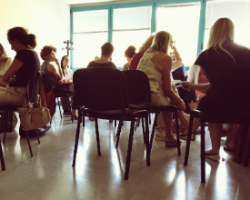Case study: A dialogical approach to enhancing integrated, multiprofessional and people-centred services. Cooperation between the Emilia-Romagna Region, Italy, and Finland

Heikki Ervast
Finland’s dialogical approach
Over the last two decades, Finland has developed a methodology for bringing professionals into dialogue with a view to combining resources. Applied in the health field, dialogical encounters in multidisciplinary or multiagency teams have great potential for solving problems and promoting integrated, people-centred practice.
Experimental collaboration
Based on this approach, in May 2018, the Health and Social Agency and the Direction of Health and Welfare of the Emilia-Romagna Region in Italy and the University of Lapland, the Regional Council of Lapland and the National Institute of Health and Welfare of Finland initiated a joint experimental training-intervention project aimed at enhancing multiprofessional and people-centred team work at the institutional, organizational and professional levels. The project will span a period of 18 months.
In the Emilia-Romagna Region, the approach has been adapted to, and is being piloted in three municipalities, involving administrators and professionals of the educational, social and health services working with adolescent population. Training is provided through regular “regional laboratories” led by Finnish trainers and continuous courses facilitated by expert tutors in the three municipalities. Tools and methodologies for promoting dialogue, reflexivity, networking, peer-to-peer learning and knowledge sharing are being tested and applied in concrete case studies. Local governance and professionals are engaged in developing the necessary skills to facilitate interprofessional integration and networking at the institutional, organizational and professional levels.
The project also involves international research into factors related to, and strategies and mechanisms for, the sustainable and successful implementation of organizational and cultural change. Analyses have been carried out in the contexts of Lapland and the Emilia-Romagna Region. Mechanisms for scaling-up from the local to the regional and national levels are also being studied.
This work is part of a broader methodology for innovating organizational and professional models through dialogue and interprofessional integration, which is presented in Emilia-Romagna’s 2017–2019 Social and Health Plan and Priority Areas of Intervention.
It is anticipated that the project will result in:
- a network of trained professionals, embedded in local services, with the double role of facilitating integration and a people-centred approach, and training colleagues, thus providing a multiplier/cascading effect;
- increased coordination of effort and synergy at the local level, and strengthened organizational and professional skills based on an integrated, interprofessional approach;
- the establishment of dialogical spaces, both interprofessional and professional–citizen, at the local level, and an increase in the perceived satisfaction of all actors involved;
- the development of sustainable organizational and professional pilot models to overcome fragmentation and promote integrated, multiprofessional work and scale up opportunities.
As underlined in the WHO Global strategy on human resources for health: Workforce 2030 (2016) and recently highlighted during the Global Conference on Primary Health Care held in Astana, Kazakhstan, in October 2018, interprofessional, people-centred work is essential to promote health and ensure equitable access for all, including poor and fragile populations. Human resources for health play a fundamental role in meeting the new, growing demands for social and health care and in addressing the paradigm shift in the way health services are funded, managed and delivered. Action is needed, therefore, to broaden the scope of human resources with competences for engaging with non-health sectors, working in multidisciplinary teams and actively involving the community.
Along these lines, the Emilia-Romagna Region is interested in collaborating with and creating synergy among other regions and international institutions.



